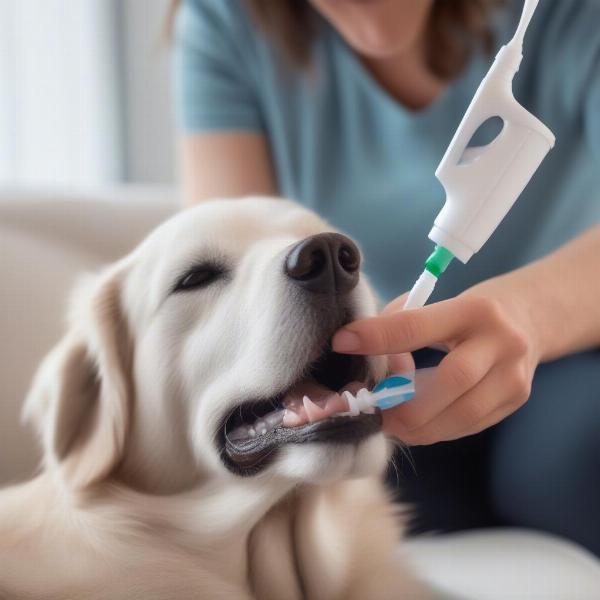Antibacterial mouth rinse for dogs is a topic gaining traction amongst pet owners concerned about their furry friend’s oral health. But is it necessary? This comprehensive guide will explore the benefits and risks of using antibacterial mouth rinses for dogs, helping you make informed decisions about your pet’s dental care. We’ll delve into different types of rinses, how to use them effectively, and alternative oral hygiene practices.
Understanding the Need for Antibacterial Mouth Rinse in Dogs
Just like humans, dogs are susceptible to plaque and tartar buildup, which can lead to gum disease, bad breath, and even tooth loss. While regular brushing remains the cornerstone of canine dental hygiene, antibacterial mouth rinses can offer additional protection against harmful bacteria. They can reach areas of the mouth that brushing might miss, providing a more comprehensive clean. However, not all dogs need an antibacterial rinse, and it’s crucial to understand when and how to use them appropriately.
 Applying antibacterial mouth rinse to a dog
Applying antibacterial mouth rinse to a dog
Benefits of Using Antibacterial Mouth Rinse
- Reduces plaque and tartar buildup: Antibacterial rinses help control the bacteria responsible for plaque formation, minimizing the risk of tartar development and subsequent gum disease.
- Freshens breath: Bad breath in dogs is often a sign of poor oral hygiene. Antibacterial mouth rinses can neutralize odor-causing bacteria, leaving your dog with fresher breath.
- Soothes irritated gums: Some rinses contain ingredients that can help soothe inflamed gums caused by gingivitis.
- Easy to use: For dogs that resist brushing, a mouth rinse can be a less stressful alternative or supplement to traditional brushing.
Risks and Considerations
- Ingestion: Some mouth rinses contain ingredients that are harmful if swallowed. Always choose a veterinarian-recommended, pet-safe product.
- Allergic reactions: Certain ingredients can trigger allergic reactions in some dogs. Monitor your dog closely after the first use for any signs of discomfort or irritation.
- Not a replacement for brushing: While helpful, mouth rinses should not replace regular brushing. They are best used in conjunction with other dental hygiene practices.
Choosing the Right Antibacterial Mouth Rinse for Your Dog
Selecting the right rinse is crucial for your dog’s safety and oral health. Look for products specifically formulated for dogs and avoid using human mouthwash, which can contain toxic ingredients like xylitol. Consider factors such as your dog’s age, breed, and any existing dental conditions. Consult your veterinarian for personalized recommendations. benzoyl peroxide shampoo for dogs can be a beneficial addition to your dog’s hygiene routine, particularly for skin conditions.
How to Use Antibacterial Mouth Rinse for Dogs
Follow these steps for safe and effective application:
- Choose a pet-safe product: Consult your veterinarian for recommendations.
- Measure the correct dosage: Follow the instructions on the product label.
- Gently lift your dog’s lip: Expose the gums and teeth.
- Squirt the rinse along the gum line: Avoid spraying directly into the throat.
- Allow the rinse to work: Do not rinse or allow your dog to drink water immediately afterward.
Alternative Oral Hygiene Practices for Dogs
While mouth rinses are beneficial, other practices are essential for optimal oral health:
- Brushing: Regular brushing with a dog-specific toothpaste is the most effective way to remove plaque and prevent tartar buildup.
- Dental chews and treats: These can help mechanically clean the teeth and freshen breath.
- Professional dental cleanings: Schedule regular cleanings with your veterinarian to remove tartar and address any dental issues. Considering other topical treatments like lime sulfur dip for dogs might be beneficial depending on your dog’s specific needs.
Conclusion
Antibacterial mouth rinse for dogs can be a valuable tool in maintaining good oral hygiene, particularly when used in conjunction with regular brushing and other preventative measures. Remember to choose a pet-safe product and consult your veterinarian for personalized recommendations. By prioritizing your dog’s dental health, you can contribute to their overall well-being and happiness.
FAQ
- Is human mouthwash safe for dogs? No, human mouthwash can contain ingredients toxic to dogs, such as xylitol.
- How often should I use antibacterial mouth rinse on my dog? Follow your veterinarian’s recommendations, as frequency varies depending on the product and your dog’s individual needs.
- Can I make my own dog mouth rinse? While some homemade recipes exist, it’s best to use veterinarian-approved products to ensure safety and efficacy. hibiscrub dogs is another option for certain skin conditions.
- What are the signs of dental problems in dogs? Bad breath, red or swollen gums, excessive drooling, difficulty eating, and loose teeth are all potential signs of dental problems.
- Are there any side effects of using antibacterial mouth rinse for dogs? Some dogs may experience mild gastrointestinal upset or allergic reactions. Consult your veterinarian if you notice any adverse effects.
- Can I use antibacterial mouth rinse on puppies? Consult your veterinarian before using any dental products on puppies.
- What should I do if my dog swallows antibacterial mouth rinse? Contact your veterinarian immediately.
ILM Dog is a leading international online resource dedicated to providing dog owners with expert advice and information on all aspects of dog care and well-being. From breed selection and health to training and nutrition, we offer a wealth of resources to help you provide the best possible care for your canine companion. We also offer expert guidance on products like dog tea tree oil shampoo and benzoyl peroxide dog shampoo. For personalized advice or to learn more about our services, contact us at [email protected] or call us at +44 20-3965-8624. ILM Dog is here to help you and your dog live a happy, healthy life together.